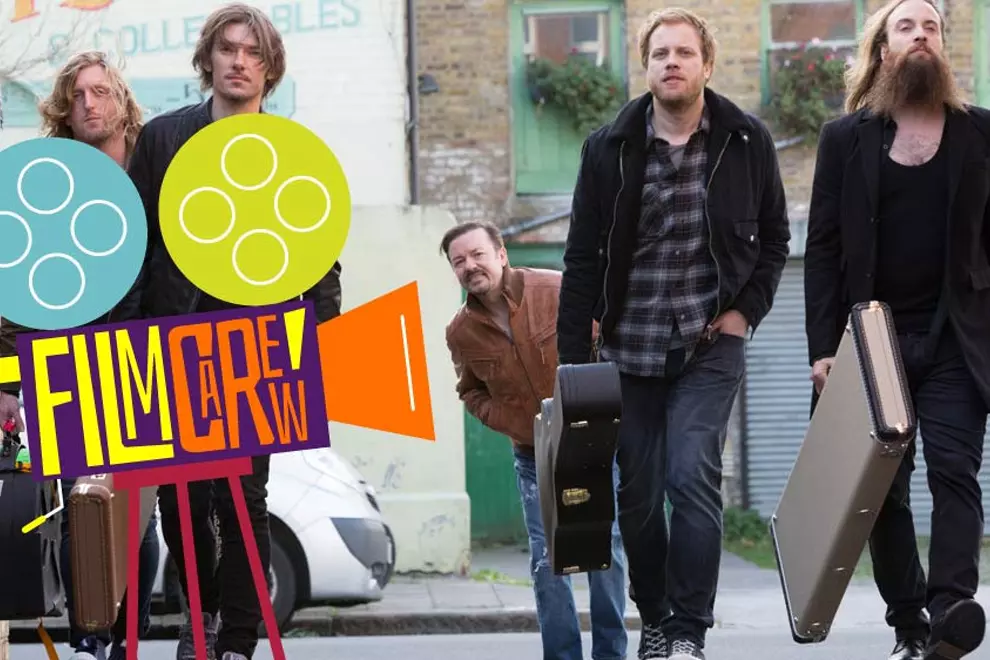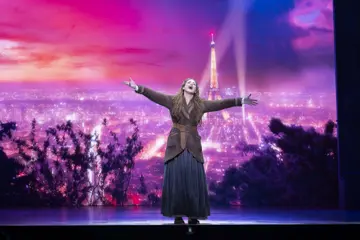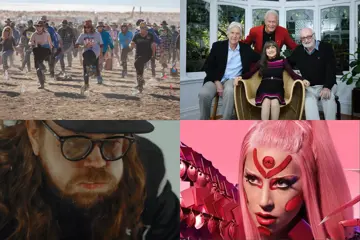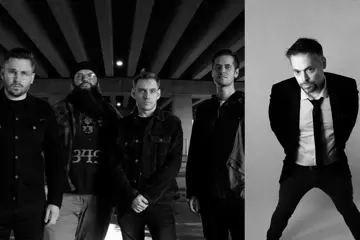DAVID BRENT: LIFE ON THE ROAD

At what point does cringe comedy become plain excruciating? Right here. Needlessly dusting off his most famous comic creation 15 years removed from his glory days, Ricky Gervais foists an unwanted full-length spin-off upon any audience members who still harbour fond Office memories.
The joke here —there’s just the one— is that David Brent, former paper-mill boss, has turned his once on-the-margins rock’n’roll dreams into his full-blown passion. Well, for a couple of weeks at least. And, so, he sets out on tour —the original mockumentary set-up— for a bunch of first-band-on-the-bill shows in the greater Berkshire region. His songs are terrible, his stage banter’s terrible, his dance moves are terrible. His set is full of misguided machismo, blithe condescension, and cultural appropriation. He’s the horrifying manifestation of middle-age-white-male cluelessness, a source of cheesy dad jokes steeped in offensive stereotypes, a buffoon who embarrasses the session musicians forced to play along.
Just in case you’re too dim to get this one joke, Gervais —the film’s director, writer, and star; rolling solo minus old Office co-creator Stephen Merchant— has it spelt out, again and again. “I didn’t know whether to laugh or cry,” says one of his band-mates. “He’s white, he’s old, and his music’s terrible,” says Ben Bailey Smith (AKA: rapper Doc Brown; AKA: Zadie’s brother), Brent’s adopted black friend/quasi-protégé. The idea of this being a tepid sequel to the TV show exists within the film’s world, too: characters mentioning how the original series made Brent look terrible; a radio-host inviting along the washed-up former ‘docu-soap’ star for a humiliating interview; Brent and band booked for an ironic gig at a trash-embracing student union party.
The only interest comes, really, when you peer beneath the scripted self-reference, and wonder how much of Gervais, himself, is in the main character. Gervais plays Brent, as ever, as an overgrown child, craving attention and absent any self-awareness. He’s forever pandering for a laugh, out of desperate neediness; there a psychological compulsion to his naked thirst. Gervais, too, seems the same: there’s few moments, here, that don’t find him endlessly mugging for the camera.
Don't miss a beat with our FREE daily newsletter
It’s a ham turn that grows almost instantly tired; one that shows, with all-too-unflattering clarity, that both character and creator had their moment in the sun 15 years ago. By this point, Gervais is just “wedding dancing” on The Office’s grave. Life On The Road will make you cringe, and wince, and wish it was over, but it’ll never make you laugh.
BLOOD FATHER

Assumedly, there’s a certain kind of audience for whom the premise ‘Mel Gibson shoots Mexicans’ suggests sheer cinematic catnip. Blood Father is a movie made just for them. Here, ol’ Mel is an ex-con/recovering-alcoholic who runs a trailer-park tattoo shack in the middle of the blasted, hellish California desert. He gets a phone call from his estranged daughter, coke-railing teen runaway Erin Moriarty, who’s just been involved in a shootout with boyfriend Diego Luna and his gang o’ menacing, mugging cholos.
Soon, daughter is hiding out under the wing of dad, and dad is shooting people. It’s, essentially, the middle-aged-rage of Taken with hints of shoot-out Westerns. At first, Gibson is protecting his daughter, but soon she gets, um, taken, and so he has to hunt them down. It’s a cheap, nasty, bloody B-movie, director Jean-François Richet —the guy who helmed the two Mesrine/Public Enemy films— creating enough mounting tension, escalating pace, and classic shoot-outs to pass muster.
FREE STATE OF JONES

Free State Of Jones looks, at first blanch, to be a work of Hollywood prestige-picture formula: Matthew McConaughey out to overthrow slavery in a post-12 Years A Slave picture helmed by Gary ‘Seabiscuit’ Ross, and shot through with White Saviour clichés. It’s based on a true story in which, in Civil War Mississippi, a group of Confederate deserters and runaway slaves banded together to fight off the redneck Rebs. Taking ownership of a tract of impenetrable swamp as a ‘free’ secessionist terrain, their act of dissident defiance made for America’s first truly integrated micro-state.
And, sure enough, McConaughey is the action hero of such a tale, a disillusioned battlefield nurse elbows-deep in the slaughter and horror of the war. With his off-sider Christopher Berry whispering political agitations in his ear, Matty Mac can no longer stand the conscription of local lads —and their farms’ food and provisions— into the Confederate army; not when the sons of wealthy slave-owners are permitted to stay home. Forced to fight for the right of wealthy men to protect their corn and coloureds, he refuses to remain a foot-soldier in someone else’s battle. So, he flees, turning into a Woke Robin Hood as he goes. Like all White Knights, McConaughey uses his white-male-privilege to positive effect: protecting (and arming!) women and children, removing the iron collars of runaway slaves, and leaving behind his white wife (Keri Russell) to romance a new black one (Gugu Mbatha-Raw).
Yet, as glibly as it can be reduced, Free State Of Jones isn’t a film about race, nor even a problematic portrait of it. It’s, instead, a film about class. Its dissident army is brought together due to their social status; bonded by being poor, disenfranchised, marginalised. Its ‘free state’ may play as post-hoc post-racial fantasy, but it’s really a portrait of a peasant’s uprising. Ross casts a big-picture view of institutionalised racism and systems of oppression, moving from the Civil War through the Reconstruction and the Jim Crow South. One at-first incongruous narrative strand, essentially a mid-20th-century C-story, finds McConaughey’s great-grandson in court, his ethnicity essentially put on trial.
The result is an earnest picture that never quite takes hold, that finds idiosyncratic character details or complex socio-political concepts washed away in the forward march of time, in the simplification of its true-tale history lesson. But, for a film that seems like it should be a work of liberal-guilt-cleansing, there’s a sense of real radicalism in its depiction of civil dissidence turned guerrilla skirmish. Free State Of Jones is about war, sure, but it’s really about class warfare. It heroises an uprising against economic disparity, and comes at a time in which that disparity has never been so disparate.
SUNSET SONG

For those who love a tragic period piece in which a headstrong woman battles against social conventions in the grim countryside, Sunset Song plays as some kind of tragic-period-piece-in-which-a-headstrong-woman-battles-against-social-conventions-in-the-grim-countryside porn. Adapted from Lewis Grassic Gibbon’s Scottish classic-lit tome by writer/director Terence Davies, it pulls the oldest trick in the tragic-period-piece-in-which-a-headstrong-woman-battles-against-social-conventions-in-the-grim-countryside book: casting an incredibly beautiful woman —here former model Agyness Deyn— in the title role. The unintended implication is clear: tragic things happening to women in rural Scotland are one thing, but tragic things happening to an incredibly beautiful woman in rural Scotland are just so much more tragic!
Deyn is born into suffering: she’s the daughter of Peter Mullan, once again playing the angry, violent drunk. He’s a standover patriarch who deals out abuse and knocks up his long-suffering, suicidal wife Daniela Nardini. But, when he drinks himself to death, Deyn is unexpectedly willed the ownership of the family farm, setting local tongues wagging by running the farm herself as ahead-of-her-time Independent Woman. Eventually, she gets hitched to sweetie Kevin Guthrie, but when he’s sent away to war, he comes home an even-more-eye-rolling caricature of the violent, drunken Scot than Mullan was.
Going by the bare bones of its story, Sunset Song isn’t worth recommending at all. Except, y’know, for those with a jones for tragic-period-piece-in-which-a-headstrong-woman-battles-against-social-conventions-in-the-grim-countryside. But Davies makes his matinée melodrama into something artful, lyrical, but way of a run of memorable images and painterly frames: scenes where horses are rescued from a thunderstorm, where lovers-to-be-tentatively flirt amidst a herd of sheep, where a congregation cuts through a field of auburn wheat in a dappled sunrise. They’re moments of pure beauty that rise above convention, even if the drama never does.
ENDLESS NIGHT

Endless Night —known, elsewhere, as Nobody Wants The Night— is largely set in the sunless winter of the Arctic Circle. That set-up suggests snowy vistas and widescreen wonder, but it’s mostly shot on sets: Juliette Binoche and Rinko Kikuchi camped out in an unconvincing-looking hut on Ellesmere Island in 1908, awaiting the arrival of Binoche’s unseen husband. A film built around two of the greatest actors in the world sounds amazing, but nothing about Endless Night quite works, including their two central performances. Binoche is haughty, blustering; playing her socialite turned lady-adventurer with theatrical flourish. Kikuchi delivers a different kind of old-fashioned turn: reduced to being the smiling savage, talking in stilted, pidgin English as an Inuit left behind to attend to —and impart wisdoms to— the lady. It’s an odd, unconvincing, uncomfortable film being given scattered release at the cinematic fringes. And it marks the latest chapter in the wildly-uneven, barely-mediocre career of Spanish director Isabel Coixet, a prolific director-for-hire who exists in the netherworld between art-movie auteurs and prestige-picture helmers. Her best-known works are the old-person-friendly cross-cultural romance Learning To Drive, the awful young-mum-with-cancer button-pusher My Life Without Me, and the buttoned-up Philip Roth adaptation Elegy. Coixet has never authored a singular directorial vision, nor made a truly memorable film; and Endless Night, wasting a great cast and a top-of-the-world setting, sure doesn’t mark a change.
















